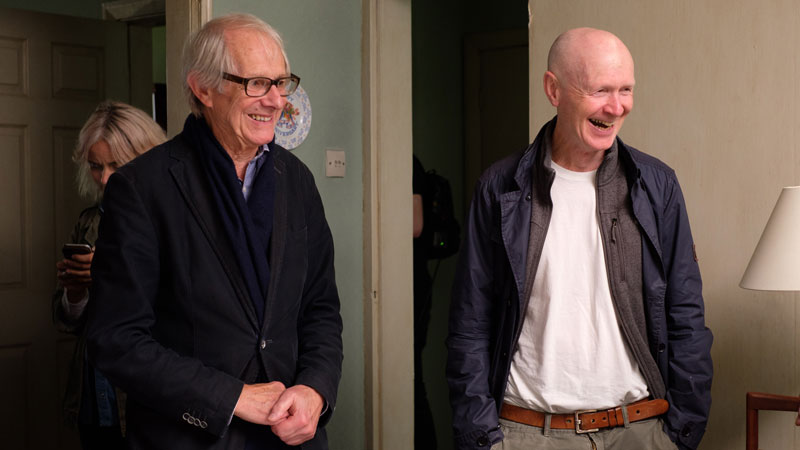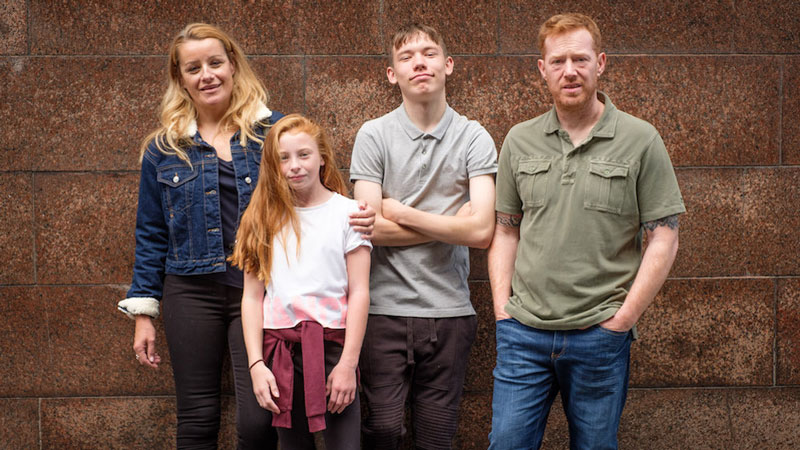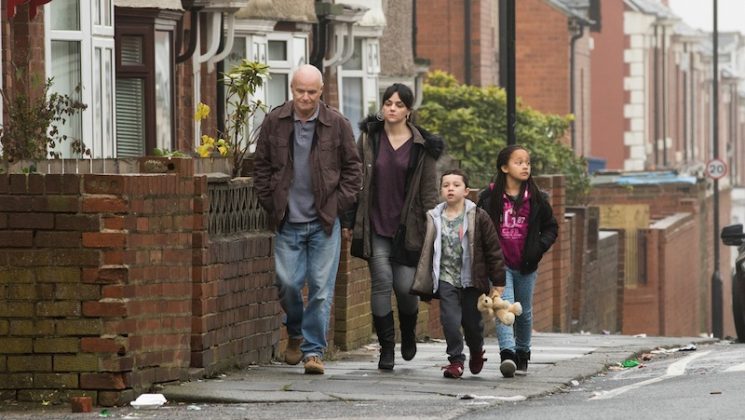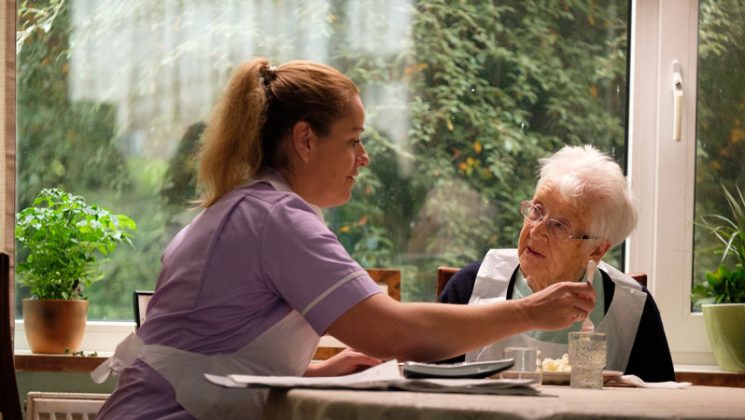Debbie Honeywood as a care worker whose family is falling into debt in ‘Sorry We Missed You’. All images: Joss Barratt
Ken Loach is 83 years old, way past the age when most people would be settled deep into retirement. And directing is no easy task – tough on the mind and the body, with dozens of people to deal with, from actors and extras, to technicians and financiers. So why is he still putting himself through all of that?
“Well the world’s just too interesting, isn’t it?” he says, a gleam in his eye. “There’s too much going on. Every time you turn on the news there’s something. And you think you should have a go.”
That answer sums up Britain’s most indefatigably political filmmaker. In the 50-odd years since Cathy Come Home, which helped to launch the housing charity Shelter, Loach’s dramas have unfalteringly charted the difficulties experienced by ordinary people at the bottom of the economic ladder.
His last, I, Daniel Blake in 2016, sparked national debate about a welfare system that was driving people towards poverty. And his new film, released on 1 November, is equally hard-wired into current affairs and social injustice – in this case, the gig economy and the plight of precarious workers.
Sorry We Missed You concerns a family in crisis. Ricky (Kris Hitchen) is a driver for a parcel delivery service, working all hours of the day at breakneck speed to ensure that every customer receives their parcel when promised. He’s freelance, footing his own costs, with no guarantee of work, no sick or holiday leave – but open to a minefield of dubious fines should he under-perform. And he has no union back-up.
Ricky’s job gives the film its ironic title, highlighting the fact that beneath the sweet-talking facade of the highly competitive retail industry lies exploitation.
But the same might be said of outsourced public services. Ricky’s wife Abby (Debbie Honeywood) is a homecare worker, employed by an agency. She’s caring and conscientious but with too much to do in the short time allotted each client, no overtime pay, no reimbursed travel costs. In one of the film’s many cruel twists, in order to fund the van Ricky needs for his new job, he sells the car that is integral to Abby’s own work.
A number of UNISON members will understand her experience all too well.
The pair work so hard that their home life and, particularly, the time they have for parenting their two children has evaporated. Yet still they move further into debt. “I’m sinking into quicksand,” says Abby, describing a recurring nightmare. “The harder we work, the more hours we do, we just sink further and further into this big hole.”
As ever, the idea for the film came through conversations between Loach and his regular scriptwriter Paul Laverty (below right, with Loach).

“We talked for a long time about this idea of how work is changing,” Loach recalls. “A generation ago you’d have a job and it could last your lifetime, it would give a wage that you could raise a family on, and find a house, get a mortgage, plan your life.
“That’s going now. I think two thirds of the new jobs that are being created are precarious jobs, with no guarantee of income per week, no guarantee of hours, this so-called self-employment where all of the responsibility lies with the individual worker. So there’s that constant threat of debt.
“That’s where it began. And then Paul did some investigation and passed on some stories. Paul thought the interesting way to tackle it was through a family, because that’s where the stresses appear. At work you put on a face, but when you get home there’s no patience, there’s no time. You don’t see each other, but you’re exhausted when you do.”
The care workers I met were absolutely remarkable women
It’s no accident that, like I, Daniel Blake, the new film was shot in Newcastle. “We planned it as a companion piece. You’ve got Daniel Blake in one street and he’s the victim of a knowingly bureaucratic sanction, and just around the corner there’s a family where both [parents] are precarious workers. Everything exists side by side.
“Again the idea was to tell a very simple, apparently small story, that was like an iceberg. You see a tiny fraction but underneath there’s a whole economic structure at play.”
There’s another, depressing link between the two films: many of the people the filmmakers met when researching food banks for I, Daniel Blake were working zero-hours contracts.

Family in crisis: Debbie Honeywood, Katie Proctor, Rhys Stone and Kris Hitchen
Paul Laverty’s research for Sorry We Missed You included interviewing care workers from all over the UK over a six-month period, before introducing them to Loach.
“The care workers I met were absolutely remarkable women,” the writer says. “They were all women. And they weren’t doing it for the money. They had a vocation for it.
“They had different time slots, but the lowest I heard was 15 minutes. What they have to do in those 15 minutes sometimes is unbelievable – give the patients their meds, clean them, talk to them. Many spend extra time, doing extra things for them, without getting paid for it.
“And they were furious about the way many of their patients were treated. A lot of carers said that because these people are old, and confused, and frightened, these people are nearing the end of their lives, they have the right to see the same person. [Continuity of care is not assured.] That’s profound, it’s common sense, it’s not market driven but human driven. I met great people like that.”
The devil in the detail
Laverty has a feast of stories, often referring to “the devil in the detail.” One young woman showed him her phone, on which she’d been called 37 times in one day by her agency, asking her to go into work – on her day off.
Another told him that she and her fellow care workers would meet in a cafe in between appointments, just for a chat in their own time, until their agency heard about it and forbade them.
“They said, ‘It’s our time, we’re not getting paid’. But the company said no. And of course they could just cut off their contracts. Their justification was that the public might see their uniforms and think they’re not doing their work. But what it really was that the carers would be in contact with each other, hear each other’s stories and just be closer.
“That shows you how vulnerable they were, in their own free time.”
Despite their difficulties, Loach was equally impressed. “They’re extraordinary people. By and large they give far more than they’re paid for, and obviously develop real relationships with people.
“Some had cars, but a lot of them were on public transport. [If] they get a 20-minute appointment they’re paid a third of the minimum hourly rate – and it’s taken them 40 minutes of public transport to get there. So it’s absolute poverty wages.”
He adds that local authorities will turn a blind eye to the fact that low bids for care contracts may be based on exploitation of the people actually providing the service. “And it’s much harder for the people who are working for a private healthcare company to get organised into a union, than for workers who work for a local authority and have proper contracts.”
He agrees that unions are as vital today as they’ve ever been. “Absolutely. They’re essential, it’s our basic means of organisation.”

Most films can’t do much more than shed light on an issue. But I, Daniel Blake (pictured above) struck a particularly powerful chord with the public, not least through more than 700 community screenings, leading to fulsome public conversation and the film being discussed in Parliament.
Charities, churches, trade unions, and others were able to hire the film for a small fee and arrange a screening that spread the word while doubling as a fundraiser. The same approach will be taken with Sorry We Missed You (see below).
“Sometimes you get lucky,” Loach reflects. “I, Daniel Blake just connected with people. There was a sense of outrage waiting to be expressed. Paul and I went to a lot of the screenings and spoke. More importantly, people would get up and say: ‘That happened to me. That happened to my neighbour’.”
Adds Laverty: “When people come together, see each other, they talk. I hope our film touches people, but it’s what people can bring about their own lives. Everywhere you look now you see massive exploitation and incredible inequality. I think a lot of people are saying: ‘No, we’ve had enough of it’.”
Sorry We Missed You is released on Friday 1 November.
Community screenings
From 6 December the film’s distributors are giving the chance to hold your own community screening of the film. See here for details.


